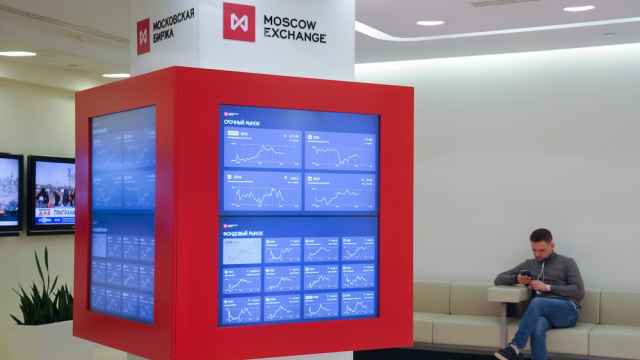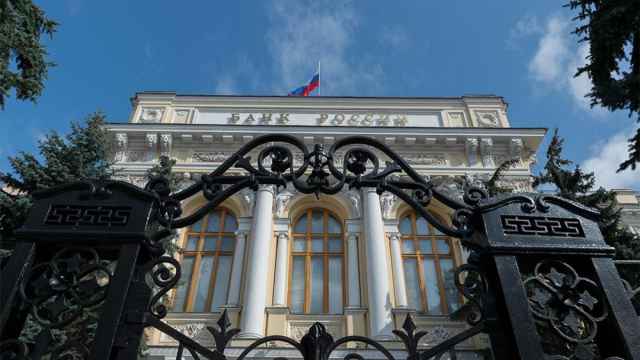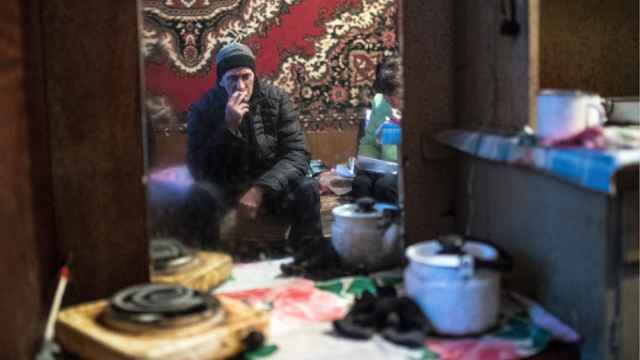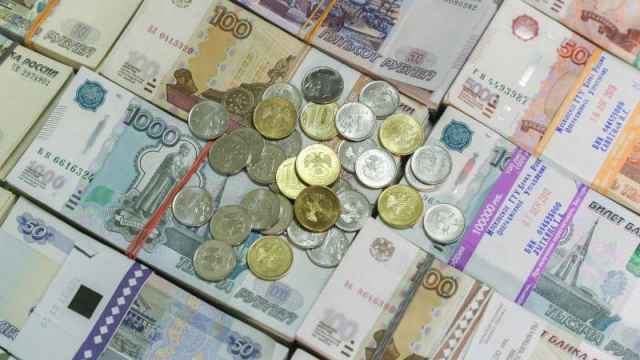As Russia approaches its annual New Year celebrations, a once-joyous occasion now seems more like a grim countdown to the country falling off an economic precipice.
With warning lights flashing, ordinary Russians are tightening their belts amid galloping inflation and a plunging ruble while the Kremlin raises the possibility of introducing food cards for the poor. All the while, the Central Bank is scrambling to stabilize the economy through interest rate hikes and foreign currency interventions.
Moscow Mayor Sergei Sobyanin has already confirmed that fireworks will be canceled again this year due to the ongoing war with Ukraine. Meanwhile, old friends of mine in Moscow are beginning to panic about affording the traditional New Year’s Eve feast, as inflation and a weakened ruble threaten to shrink the usual abundant spread of fine food and booze.
New Year's Eve in Russia is the mother of all public holidays, as if Thanksgiving, Christmas and New Year were all rolled up into one. But with the ruble in freefall, the cost of imported goods is surging just as Russians prepare to splurge for the two-week holiday. Domestically produced food prices have also surged, fueled by inflation, supply chain disruptions, and the debilitating effects of sanctions on production.
Rusprodsoyuz, the Russian food union, estimates the basic cost of the Novogodniy stol (New Year’s table) has risen this year by 11.4% to 12,000 rubles. The lavish feast typically consists of red caviar, smoked salmon, dry-cured sausage, boiled-smoked sausage, kholodets — cold stewed meat in aspic — cheese, apples, bananas, oranges, champagne and cognac.
Salads, rather than hot dishes, are the centerpiece of any Russian holiday spread. While Herring Under a Fur Coat — a colorful layered salad with pickled herring — and tinned-fish Mimosa are firm favorites, the undeniable star is Olivier Salad — a decadent mix of boiled potatoes, eggs, pickles, carrots, peas and either sausage or chicken, all lavishly coated in mayonnaise.
But this year, as inflation takes its toll, the cost of Olivier has soared. Key ingredients like chicken and mayonnaise have risen by over 30%, while potatoes have spiked by a staggering 65%. According to RIA Novosti, citing Rosstat data, four servings of this holiday staple will now cost 553 rubles — an 8.5% jump in the Olivier Index.
The scramble by ordinary Russians to source ingredients may become more difficult on Dec. 20 if the Central Bank again hikes interest rates, already at a two-decade high.
With rates poised to climb 200 basis points to 23%, borrowing costs will skyrocket — affecting everything from consumer loans to credit cards and mortgages – just as many are already feeling the squeeze.
By raising the key interest rate, Central Bank head Elvira Nabiullina aims to curb consumption and, ultimately, bring down prices.
However, her strategy has drawn criticism, including from many oligarchs. VTB Bank CEO Andrei Kostin argues that high rates are ineffective in fighting inflation, given the burdens of heavy sanctions and military spending that undermine the effectiveness of monetary policy.
Many Russian bankers and industrialists now worry that the economy could be heading into a tailspin like 2008, when a credit crisis led to waves of bankruptcies.
Nabiullina’s Central Bank has steadily raised rates since the second quarter of 2023 to tackle persistent inflation and stabilize the ruble. However, the surging borrowing costs are now pushing many companies into a debt spiral, with interest payments eating up one in every four rubles they earn.
The first casualty is Ralf Ringer, Russia’s largest shoe manufacturer, which was declared bankrupt on Dec. 7 after its accounts were blocked due to debts and fines of 1.5 billion rubles.
Real estate developer Samolet is now slashing jobs amid a slump in new apartment sales. By the end of 2024, around 2,000 employees are expected to be laid off, following 5,000 job cuts earlier this year, according to a Lifenews report on Dec. 8.
Even Kremlin loyalists like Sberbank CEO Herman Gref are publicly admitting that the economy is tanking. Speaking at an investor forum on Dec. 6, Gref acknowledged "significant signs of an economic slowdown” especially in housing, construction, and investment.
“The situation is difficult,” said Gref, a former economy minister who heads a bank controlling half of the nation’s deposits and a third of its lending. “A number of borrowers will be in a difficult situation and banks will be in a difficult situation.”
For ordinary Russians trying to make ends meet, the specter of higher food prices haunts every shopping trip. An elderly friend in Moscow shared that keeping up with the ever-fluctuating prices at her local Pyaterochka supermarket has become nearly impossible, with costs changing multiple times a day.
“It’s hard to keep up as shelf-stackers are constantly changing the prices,” said the pensioner. “The shelves are plentiful, and I see we now have butter from Turkey and the Emirates. But the prices are way outside of my budget.”
In response to soaring prices, the Kremlin is pressuring major supermarket chains to curb costs ahead of the New Year. Controlling price hikes before the holidays is politically crucial for the Putin administration, which is working to shield the population from the worse effects of the war in Ukraine.
According to Izvestia, leading dairy producers recently met with the Agriculture Ministry, the Federal Antimonopoly Service (FAS), and major retailers to agree on price cuts for essential goods ahead of the holidays. This reflects the Kremlin’s ongoing use of administrative measures to curb high prices, a tactic it has deployed before — though typically for short periods.
As part of this effort, major dairy producers will cut prices by 10-15% on selected items, including budget milk and butter. Retailers will cap their markup at 5-10% until the price freeze ends. However, while chains like X5, Magnit, Dixy and Auchan have agreed, others such as Metro, Lenta and Monetka have rejected the plan.
Desperate times are calling for desperate measures when it comes to planning New Year’s Eve menu.
Instead of gorging on black or red caviar, some are opting for baklazhannaya ikra (eggplant caviar), a delicious substitute made by grilling peppers and eggplant along with raw garlic and tomato. A few are considering skipping the Olivier altogether, opting instead for more affordable options like the beetroot-based vinegret salad.
Most Russians are no strangers to hardship, and New Year’s Eve has always been an occasion to defy the odds. During periods of crisis, when resources are scarce, the instinct is not to cancel the celebration, but to find a way to make it happen — no matter the cost.
Since 2006, I have experienced and survived a dozen New Year's Eve feasts in Moscow — some grandiose, others more modest. For Russians, who have long faced economic struggles and repression, this spirit of celebratory defiance is woven into their identity. Even in the face of uncertainty, they will always find a way to feast, as living like it’s the last day of the year is deeply embedded in their cultural psyche.
For many, the New Year is not just about caviar and the songs of Mikhail Krug. Instead, it symbolizes holding on to life and joy, even when the world seems to be unraveling. Rooted in a fatalistic yet hedonistic outlook, many Russians live by the mantra: we only live once.
So, as Russia gears up to ring in 2025, the real question is not whether the champagne will flow, but whether the hangover will be enough to forget the cost of everything.
A Message from The Moscow Times:
Dear readers,
We are facing unprecedented challenges. Russia's Prosecutor General's Office has designated The Moscow Times as an "undesirable" organization, criminalizing our work and putting our staff at risk of prosecution. This follows our earlier unjust labeling as a "foreign agent."
These actions are direct attempts to silence independent journalism in Russia. The authorities claim our work "discredits the decisions of the Russian leadership." We see things differently: we strive to provide accurate, unbiased reporting on Russia.
We, the journalists of The Moscow Times, refuse to be silenced. But to continue our work, we need your help.
Your support, no matter how small, makes a world of difference. If you can, please support us monthly starting from just $2. It's quick to set up, and every contribution makes a significant impact.
By supporting The Moscow Times, you're defending open, independent journalism in the face of repression. Thank you for standing with us.
Remind me later.








